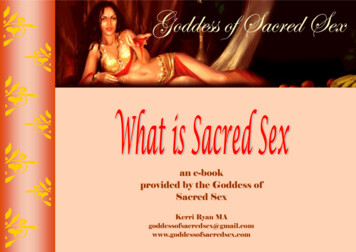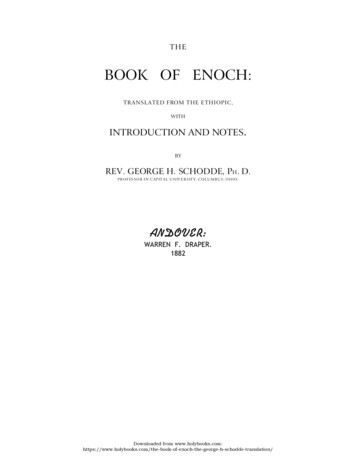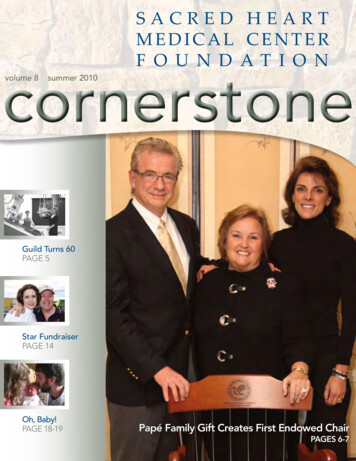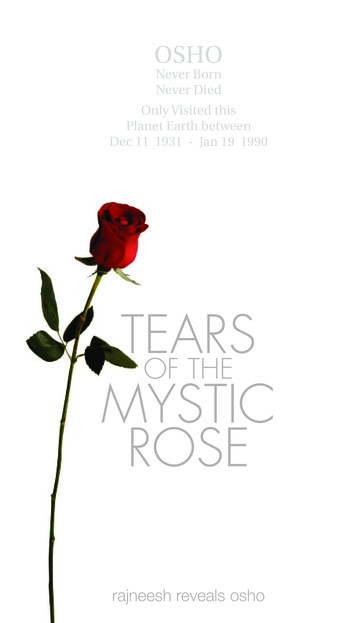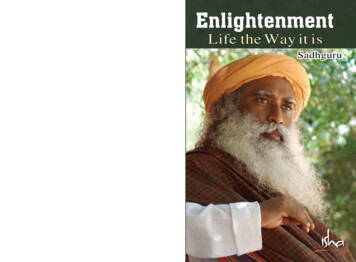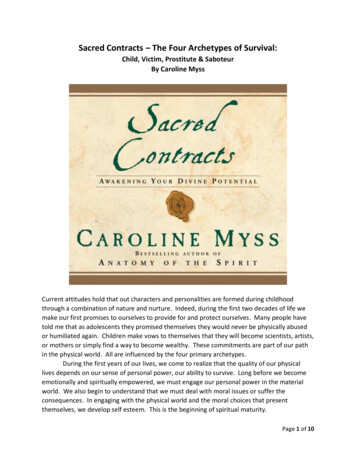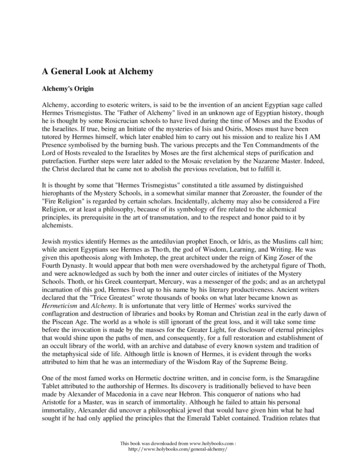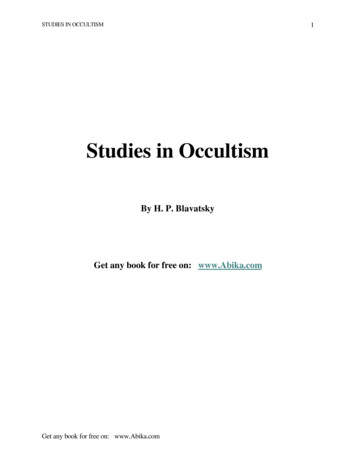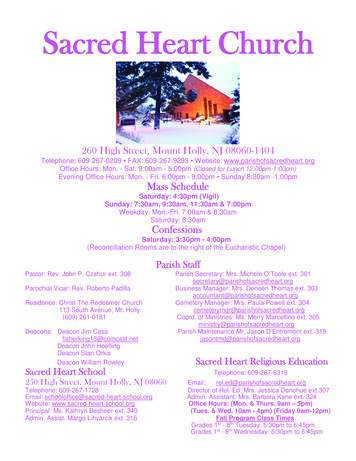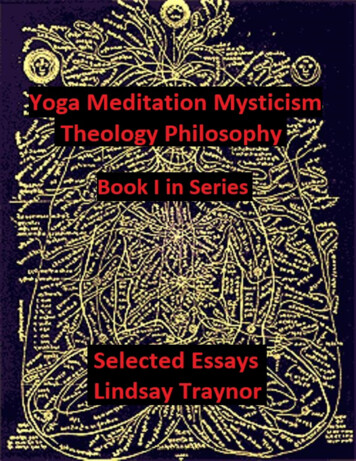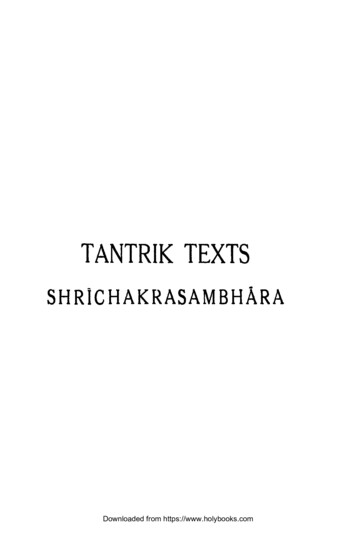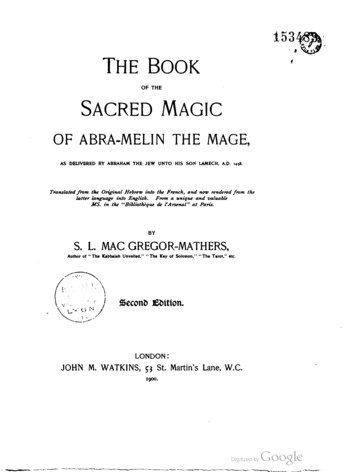
Transcription
153m;i5THE BOOKOF THESACRED MAGICOF ABRA-MELIN THE MAGE,AS DELIVERED BY ABRAHAM THE JEW UNTO HIS SON LAMECH, A.D. "58.Translated from the Original Hebrew into the Frenth, and not; rendered from thelafler language into English. From a unique and valuableMS. in the "Bibliotlu‘gue de l'Arsenal" a! Paris.BYS. L. MAC GREGOR-MATHERS,Author of "The Kabbalnh Unveiled." "The Key of Solomon." "The Tarot," etc.Seconb Ebition.\L‘Y'C)4*‘ /LONDON:JOHN M. WATKINS, 5; St. Martin’s Lane, W.C.1900.'
THE CRANI'ORD PRESS;CHISWICK,LONDON, \V.Entered at Stationers’ Hall.All rights reserved.
TABLEOF CONTENTS OF THEINTRODUCTION,BY S. L. MAC GREGOR-MATHERS.Notice of the “ Bibliotheque de l’Arsenal ” at Paris.—The Manuscriptof the present work known to Bulwer Lytton and Eliphas Lévi.-Similarity between Mejnour’s style of instruction of Glyndonin “Zanoni” and that employed by Abra-Melin to Abrahamthe ]ew.—Critical description of the present Manuscript; itsstyle; examples; apparent date—Abraham the Jew, his era,and occult contemporaries.—His faith and travels.—Abra-Melin.—Place of residence, and family of Abraham the Jew—Valueof this Book to Occult students.--Notable persons with whomAbraham was brought in contact, and for or against whom heworked Magic.—His warnings against the error of changing one’sreligion, whether Jew, Turk, Christian, or Pagan—The absolutenecessity of unshaken faith in order to produce a Magical effect.—The Author comparatively broad in his views, though unjustto women.—Good advice in other matters given by him.—Hiscounsel of a retired life not borne out by his own history.—Whiteand Black Magic.—Apparent basal definitions of this particularsystem of Sacred Magic.—Its advantages, especially as regardsAbraham’s comments on other Professors of Magic he had met.—The employment of a Child-clairvoyant, necessary or not.—Abraham’s intolerance of other Magical systems. —Basis of hissystem in the Qabalah.—Example of Magical Square of Lettersfrom Third Book, compared with a Pentacle in “Key ofSolomon ”.—General character of these—Practical Qabalah.—Definitions of the nature of Angels, Elemental Spirits, andDevils, with their difi’erences—Behaviour toward these, as advocated by Abraham—Meaning of the word Demon, as distinctA"
ivTABLE OF CONTENTS OF THE INTRODUCTION.from Devil.—Magic in the “Arabian Nights,” compared withrecipes in Third Book of this work—Faust and the efl'ects he issaid to have produced.—Magic and the Qabalah derived fromEgypt; difference between Egyptian and Chaldean Magic.—Value of a Sacred language and one‘s mother tongue compared.—Pentacles and Symbols.—Evocation by the Magic Circle andLicence to Depart.—Abraham’s Remarks on Astrology.—Notesto this work—This Introduction written for Occultists onlypage xvAppendix A :—Table of Hebrew Letters and English Equivalentspage xli,,B :—Cagliostro’s use of a Child-clairvoyantpage xlii,,C :—Examples of other forms of Angelic Evocationpage xliii
ACTUAL TEXT :—TABLE OF CONTENTSOF CHAPTERS.THE FIRST BOOK.The Chapters of the First Book have no separate heading of contents given in the text; while those of the Second and ThirdBooks have. I have therefore here placed those of the Chaptersof the First Book in parentheses.PROLOGUE.(The First Book to be considered as introductory to the two others,which form the actual original Magic as taught by Abra-Melin)page 3THE FIRST CHAPTER.(Abraham’s reasons for giving this work as a legacy to his sonLamech). page 4THE SECOND CHAPTER.(His Father Simon had told him somewhat of the Qabalalr—Of theMagic of Rabbin Moses' of Mayence, and how greatly inferiorthis was to the Sacred Magic of Abra-Melin). page 5THE THIRD CHAPTER.(Beginning of the Travels of Abraham the ]ew.——His going to Mayence in Vormatia (the district under the rule of Worms) to studyunder Rabbin Moses, for four years.—He then forms a friendshipwith a young Bohemian jew named Samuel.—-They resolve totravel together to Constantinople, with the intention of afterwardsvisiting Palestine—They begin their journey on February I 3th,I 397, pass through Germany, Bohemia, Austria, Hungary, and
viTABLE OF CONTENTS OF CHAPTERS.Greece, arriving at length at Constantinople, where they stop twoyears, and Samuel dies—Abraham the Jew then travels intoEgypt, where he remains four years, afterwards going into theHoly Land, where he remains a twelvemonth.—He there meetsa Christian student of Magic with whom he passes on into thewilds of Arabia; but finding no Adept there, Abraham thinks ofreturning home). page 7THE FOURTH CHAPTER.(He commences his return journey, travelling by Arabia Deserta andPalestine into Egypt—Here he lodges with an old Jew namedAaron, in a small town called Arachi, situated on the banks ofthe Nile—He tells Aaron of his numerous and fruitless travels insearch of some Great Adept in Magic.—Aaron informs him thatin the desert, not very far from Arachi, there dwells a verylearned and pious Mage called Abra-Melin ; and that he will findhim a guide to shew him the route thither.-—Abraham visitsAbra-Melin, and finds in him at length the Great and WiseMagician he has so long sought.—He remains with him andstudies under him.——-Abra-Melin gives him two Books on Magicto copy, which form the basis of the Second and Third Books ofthis work.—Abra-Melin implies that this true Sacred MagicalScience will only remain among the Jews seventy-two yearslonger.—At length Abraham quits Abra-Melin, and goes toConstantinople, where he is detained by illness for two months.—He returns home by ship to Trieste, and thence throughDalmatia). page IOTHE FIFTH CHAPTER.(Concerning the various Professors of Magical Art, whom Abrahamhad found in the course of his travels.—Of Rabbin Moses ofMayence.—Of James a Christian of Argentine, and a juggler.—Of a Black Magician called Antony of Prague in Bohemia, andhis fearful end—Of the Magicians in Austria.—Of the Magiciansin Greece—Of a Magician of Ephiba, near Constantinople, whowrote certain numbers on the ground.—Of the Magicians, Simon,and Rabbin Abraham of Constantinople—Of the EgyptianMagicians, Horay, Abimech, Alcaon, Orilach, and Abimelec.—Of the Arabian Magicians.—Abra-Melin the only truly Great
TABLE OF CONTENTS OF CHAPTERS.viiAdept—Of a Magician, Joseph of Paris, a Christian who hadbecome converted to the Jewish faith, and whose Magic wasafter the nature of that of Abra-Melin.—Abraham warns Lamechof the error of renouncing the religion in which a man is broughtup) . page I 5THE SIXTH CHAPTER.(Errors in the Magic of Rabbin Moses.—The Black Magic of Antonythe Bohemian of Prague.—The manner of his death—Of theAustrian Magicians—Of the young Sorceress of Lintz, withwhom he experimented—Of the Greek Arts of Magic.—Of themany systems of Magical working, and how that of Abra-Melinwas the best ; because based on the Wisdom of the Qabalah)Page I9THE SEVENTH CHAPTER.(Abraham prepares to perform the Operation recommended in thiswork—He acquires the knowledge and vision of his GuardianAngel; and of the Symbols of Magic like those of the ThirdBook). page 24THE EIGHTH CHAPTER.(That he practised Magic with success from 1409 to I458.—Of thedivers persons he healed—Of the Magical aid he gave to theEmperor Sigismund of Germany; how he lent him a FamiliarSpirit; and how he facilitated his marriage—Of the aid he gaveto Count Frederic by making magically an army of 2000horsemen appear.—How he helped the Bishop of his City.—How he delivered the Count of Varvich (Warwick) from anEnglish prison—How he aided the flight of Pope John XXIII.from the Council of Constance—How he forced a personwho had stolen from him, while with the Duke of Bavaria, toconfess the theft and restore the money.—Of his warnings andprophecies to the Greek Emperor (Constantine Palmologos).—How he performed the feat of raising a dead person to life, ontwo occasions, in Saxonia, and in the Marquisate of Magdeburgh.—How he obtained by Magic, both his marriage and a considerable treasure of money) . page 27.7. I .a -.- -'. ‘ a .\.-I ‘wMw - —W WM3w2 L7,
viiiTABLE OF CONTENTS OF CHAPTERS.THE NINTH CHAPTER.(General Advice—That this Art is founded on the Holy Qabalah.That all the Signs written in the Third Book are written with theLetters of the Fourth Hierarchy ; but that the mysterious wordsare taken from Hebrew, Latin, Greek, Chaldee, Persian, andArabic) . page 35THE TENTH CHAPTER.(Warning advice against the deceits of the Devil and the Evil Spirits)page 38THE ELEVENTH CHAPTER(General Advice). page 40THE TWELFTH CHAPTER.(Additional advice regarding the communication with the GuardianAngel; and of the use of a Child as Clairvoyant in theInvocation). page 43THE SECOND BOOK.PROLOGUE.(Concerning the Sacred Magic). page 49THE FIRST CHAPTER.How many, and what, are the classes of Veritable Magic. page 50THE SECOND CHAPTER.What we ought to take into consideration before the undertaking ofthis Operation. page 52THE THIRD CHAPTER.Of the Age and Quality of the person who wisheth to undertake thisOperation. page 55THE FOURTH CHAPTER.That most Books on Magic be false and vain. page 56
TABLE OF CONTENTS OF CHAPTERS.ixTHE FIFTH CHAPTER.That in this Operation it is necessary to make election neither oftime, day, nor hour . page 59THE SIXTH CHAPTER.Concerning the Planetary Hours, and other Errors of the Astrologerspage 60THE SEVENTH CHAPTER.Regarding what it is necessary to accomplish during the first twoMoons of the beginning of this Veritable and Sacred Magicpage 64THE EIGHTH CHAPTER.Concerning the two second Moons. page 69THE NINTH CHAPTER.Concerning the two last Moons which must be thus commencedpagz 70THE TENTH CHAPTER.Concerning what things a Man may learn and study during thesetwo Moons. page 72THE ELEVENTH CHAPTERConcerning the Selection of the Place. page 74THE TWELFTH CHAPTER.How one should keep oneself in order to carry out this Operationwell. page 77. page 81. page 86THE THIRTEENTH CHAPTER.Concerning the Convocation of the Good Spirits .THE FOURTEENTH CHAPTER.Concerning the Convocation of the Spirits.THE FIFTEENTH CHAPTER.Concerning what you should demand of the Spirits, who are divided‘ ' ‘‘"‘rr‘r —r’\\ .x1;‘ ‘: .; :z: \:§w
xTABLE OF CONTENTS OF CHAPTERS.into three different Troops, and convoked on three separatedays. page 92THE SIXTEENTH CHAPTER.Concerning the sending them away. page 97THE SEVENTEENTH CHAPTER.What we should answer unto the interrogations of the Spirits, andhow we should resist their demands. page 98THE EIGHTEENTH CHAPTER.How he who intendeth to operate ought to conduct himself withregard to the Spirits.page 10!THE NINETEENTH CHAPTER.Description of the Names of the Spirits upon whom we may call toobtain that which we desire .pag'e [04THE TWENTIETH CHAPTER.In what manner we ought to carry out the Operations .page [23THE THIRD BOOK.PROLOGUE.(Brief Advice).page 163THE FIRST CHAPTER.How to know all kinds of things Past and Future, which be not however directly opposed to God, and against His Holy Willpage 165THE SECOND CHAPTER.How to acquire information, and be enlightened concerning everykind of proposition, and all doubtful sciences .page 172THE THIRD CHAPTER.How to cause any Spirit to appear, and take various forms, as of man,of animal, of bird, etc. .page I 74
TABLE OF CONTENTS OF CHAPTERS.xiTHE FOURTH CHAPTER.To procure divers Visions.page I 7 5THE FIFTH CHAPTER.How one may retain the Familiar Spirits bound or free, in whatsoeverform.page 178THE SIXTH CHAPTER.How to make manifest mines, and push on all manner of work connected therewith .page 182THE SEVENTH CHAPTER.To cause a Spirit to perform all manner of Chemical work andOperations with facility and promptitude, especially as regardsMetals.pag'e 184THE EIGHTH CHAPTER.To excite Tempests.page 186THE NINTH CHAPTER.To transform Animals into Men, and Men into Animals. (Also totransform Animals into Stones).page 187THE TENTH CHAPTER.To prevent all operations of Necromancy and Magic from producingany effect ; except the Operations of the Qabalah, and of thisSacred Magic .page 190THE ELEVENTH CHAPTER.To cause to be brought to one any kind of book, and whether lost orstolen.page 192THE TWELFTH CHAPTER.To know Secrets, and especially those of any person.page 194THE THIRTEENTH CHAPTER.How to make a Corpse rise from the Dead, and perform all the Opera
xiiTABLE OF CONTENTS or CHAPTERS.tions which the person would do were he living, and this duringthe space of seven years, through the means of the Spirit. page 196THE FOURTEENTH CHAPTER.The Twelve Symbols for the Twelve Hours of the Day and of theNight, in order to make oneself Invisible to every person. page 198THE FIFTEENTH CHAPTER.To cause the Spirits to bring us everything to eat and drink which wemay wish, and even everything which we can think of .page 201THE SIXTEENTH CHAPTER.How to discover and take possession of all kinds of Treasure, provided that it be in no way (Magically) guarded.page 203THE SEVENTEENTH CHAPTER.How to fly in the Air and go wherever one may wish .page 209THE EIGHTEENTH CHAPTER.To heal divers Maladies. page 21 I.page 214THE NINETEENTH CHAPTER.For all kinds of Affection and Love.THE TWENTIETH CHAPTER.To excite every kind of Hatred, Enmity, Discord, Quarrels, Contests,Combats, Battles, Loss, and Damage.page 220THE TWENTY-FIRST CHAPTER.To transform oneself, and take divers shapes and forms. page 223THE TWENTY-SECOND CHAPTER.This Chapter is only for working Evil, for with the Signs herein wecan cast Spells, and perform every kind of Evil Work. We shouldnot avail ourselves hereof.page 225THE TWENTY-THIRD CHAPTER.To demolish Buildings and Castlesp.page 227
TABLE OF CONTENTS OF CHAPTERS.XIIITHE TWENTY-FOURTH CHAPTER.To discover Thefts.page 229THE TWENTY-FIFTH CHAPTER.To walk and operate in and under water.page 231THE TWENTY-SIXTH CHAPTER.How to open every kind of lock without a Key, and without noisepage 232THE TWENTY-SEVENTH CHAPTER.How to cause Visions to appear.page 234THE TWENTY-EIGHTH CHAPTER.How to obtain as much gold and silver as one may wish, both to beable to provide for the necessaries of life, and to live in opulencepage 243THE TWENTY-NINTH CHAPTER.How to cause Armed Men to appear.page 245THE THIRTIETH CHAPTER.To make Comedies, Operas, and all kinds of Music and Dances toappear.page 246.page.page.page.pageCONCLUSION.Remarks on these Symbols of the foregoingThe Order of the First Hierarchy .The Order of the Second Hierarchy.The Order of the Third Hierarchy.THE END.Chapters.248260260261
INTRODUCTION,BYS. L. MAC GREGOR-MATHERS. l ' "WINGperhapsto the circumstancethata theindisorpensable“ Beedecker” accords onlythree' '.four line notice to the “ Bibliotheque de l’ArIsenal ” ; but few English or American visitors 35’? to Paris are acquainted with its name, situation,or contents, though nearly all know at least by sight the“ Bibliotheque Nationale ” and the “ Bibliotheque Mazarin ”.This “ Library of the Arsenal,” as it is now called, wasfounded as a private collection by Antoine Rene’ Voyer D’Argenson, Marquis de Paulny; and was first opened to the publicon the 9th Flore'al, in the fifth year of the French Republic(that is to say, on 28th April, 1797), or just a century ago.This Marquis de Paulny was born in the year 1722, died in1787, and was successively Minister of War, and Ambassadorto Switzerland, to Poland, and to the Venetian Republic. Hislater years were devoted to the formation of this Library, saidto be one of the richest private collections known.It wasacquired in 178 5 by the Comte D’Artois, and to-day belongsto the State. It is situated on the right bank of the Seine, in theRue de Sully, near the river, and not far from the Place de laBastille, and is known as the “ Bibliotheque de 1’Arsenal ”. Inround numbers it now possesses 700,000 printed books, and about8000 manuscripts, many of them being of considerable value.Among the latter is this Book ofthe Sacred Magic of AbraMelin, as delivered by Abraham the yew unto his son Lamech ;which I now give to the public in printedformfor the first time.
xviINTRODUCTION.Many years ago I heard of the existence of this manuscriptfrom a celebrated occultist, since dead; and more recentlymy attention was again called to it by my personal friend, thewell-known French author, lecturer and poet, jules Bois,whose attention has been for some time turned to occult subjects.Myfirst-mentioned informant told me that it was known both toBulwer Lytton and Eliphas Le’vi, that the former had basedpart of his description of the Sage Rosicrucian Me/nour on thatof Abra-Melin, while the account of the so-called Observatoryof Sir Philip Derval in the “ Strange Story " was to an extentcopied from and suggested by that if the Magical Oratory andTerrace, given in the Eleventh Chapter of the Second Book ofthis present work.Certainly also the manner of instructionapplied by Mey'nour in “ Zanoni” to the Neophyte Glyndon,together with the test of leaving him alone in his abode to go ona short journey and then returning unexpectedly, is closelysimilar to that employed by Abra-Melin to Abraham, withthis dflrerence, that the latter successfully passed through thattest, while Glyndon failed.It would also be especially suchexperiments as those described at length in the Third Book,which the author of the “ Strange Story ” had in view whenhe makes Sir Philip Der‘val in the MS. history of his lifespeak of certain books describing occult experiments, some ofwhich he had tried and to his surprisefound succeed.This rare and unique manuscript of the Sacred Magic ofAbra-Melin, from which the present work is translated, is aFrench translation from the original Hebrew of Abraham theFew. It is in the style of script usual at about the end of theseventeenth and beginning of the eighteenth centuries, and isapparently by the same hand as another MS. of the Magic ofPicatrix* also in the “ Bibliothkque de l’Arsenal”. 1 knowof no other existing copy or replica of this Sacred Magic ofAbra-Melin, not even in the British Museum, whose enormouscollection of Occult Manuscripts 1 have very thoroughly studied.“' Probably the same as Gio Peccatrir the Magician, the author ofmany Manuscripts on .Magic.
INTRODUCTION.xviiNeither have 1 ever heard by traditional report of the existenceif any other copy.* In giving it now to the Public, I feel,therefore, that I am conferring a real benefit upon English andAmerican students of Occultism, by placing within their reachfor the first time a Magical work of such importance from theOccult standpoint.The Manuscript is divided into three Books, each with itsseparate Title Page, surrounded by an ornamental border ofsimple design, in red and black ink, and which is evidently notintended to be symbolical in the sl1ghtest degree, but is simplythe work of a conscientious cahgraphist wishing to give anappearance of cleanness and completeness to the ‘Title Page.The wording of each is the same : “ Livre Premier (Secondor Troisieme, as the case may be) de la Sacre'e Magie queDieu donna a Moyse, Aaron, David, Salomon et a d’autresSaints Patriarches et Prophetes qui enseigne 1a vrayesapience Divine laissée par Abraham is. Lamech son Filstraduite de I’hébreu 14.58 ”. I give the translated title atthe commencement of each of the Three Books.On the fly-leaf of the original MS. is the jbllowing notein the handwriting of the end of the eighteenth century :—“ This Volume contains 3 Books, of which here is thefirst—The Abraham and the Lamech, of whom there is heremade question, were yews of the fifteenth century, and it iswell known that the jews of that period possessing the Caba/aof Solomon passedfor being the best Sorcerers and Astrologers.”Then follows in another and recent hand :—“ Volume composed of three parts—Ist part 102 pages.2nd ,,194.3rdI I7a’4-13”)1yune, I883.”‘ Since writing the above, I have heard casually that a copy of atleast part, or perhaps of the whole, is said to exist in Holland.6
xviiiINTRODUCTION .The style of the French employed in the text of the MS. issomewhat vague and obscure, two qualities unhappily he1ghtenedby the almost entire absence if any attempt at punctuation, andthe comparative rarity of paragraphic arrangement. Eventhe full stop at the close of a sentence is usually omitted, neitheris the commencement of a fresh one marked by a capital letter.Thefollowing example is taken from near the end of the ThirdBook: “Cest pourquoy la premiere chose que tu doisfaire principalement ates esprits familiers sera de leurcommander de ne tedire jamais aucune chose deuxmemesque lorsque tu les interrogeras amoins queles fut pourtavertir des choses qui concerne ton utilite outon prejudiceparceque situ ne leur limite pas leparler ils tediront tantetdesi grandes choses quils tofusquiront lentendement ettu ne scaurois aquoy tentenir desorte que dans la confusiondes choses ils pourroient te faire prevariquer ettefairetomber dans des erreurs irreparables no te fais jamaisprier en aucune chose ou tu pourras aider et seccourirtonprochain et nattends pas quil tele demande mais tachedescavoir afond,” etc.This extract may be said to give afair idea of the average quality of the French.The style,however, of the First Book is much more colloquial than thatof the Second and Third, it being especially addressed byAbraham to Lamech, his son, and the second person singularbeing employed throughout it. As some English readers maybe ignorant of the fact, it is perhaps as well here to remarkthat in French “ tu,” thou, is only used between very intimatefriends and relations, between husband and wfe, lo'vers, etc. ;while “vous,” you, is the more usual mode of address to theworld in general. Again, in sacred books, in prayers, etc.,“vous” is used, where we employ “ thou ” as having a moresolemn sound than “tu”. Hence the French “verb “tutoyer,” “ to be very familiar with, to be an extremely friendly terms withany one, and even to be insolently familiar”. This First Bookcontains advice concerning Magic, and a description of Abraham’s Travels and experiences, as well as a mention ifthe many
INTRODUCTION.xixmar‘vellous works he had been able to accomplish by means ofthis system of Sacred Magic.The Second and Third Books(which really contain the Magic of Abra-Me/in, and are practically based on the two MSS. entrusted by him to Abraham, thej’ew, but with additional comments by the latter) dyer in stylefrom the former, the phraseology is quaint and at times rvague,and the second person plural, “vous,” is employed for the mostpart instead of “tu”.The work may then be thus roughly classified :—First Book : Advice and Autobiography ; both addressed by the Author to his son Lamech.Second Book : General and complete description ofthe means of obtaining the Magical Powersdesired.Third Book : The application of these Powers toproduce an immense number of Magical results.Though the chapters of the Second and Third Books havespecial headings in the actual text, those of the First Bookhave none ; wherefore in the “ Table of Contents” I have supplemented this defect by a careful analysis of their subject matter.This system of Sacred Magic Abraham acknowledges tohave received from the Mage Abra-Melin ; and claims tohave himsehr personally and actually wrought most of thewonderful efiects described in the Third Book, and many othersbesides.Who then was this Abraham the jew .? It is possible,though there is no mention of this in the MS., that he was adescendant of that Abraham the yew who wrote the celebratedAlchemical work on twenty-one pages of bark or papyrus, whichcame into the hands of lVicholas Flamel, and by whose studythe latter is said eventually to have attained the possession ofthe “Stone of the kVise”.The only remains of the Church ofSaint yacques de la Boucherie which exists at the present day,is the tower, which stands near the Place du Chdtelet, aboutten minutes’ walk from the Bibliothe’que de l’Arsenal; and thereis yet a street near this tower which bears the title of “ Rue
xxINTRODUCTION.Nicolas Flamel,” so that his memory still survives in Paris,together with that of the Church close to which he lived, andto which, after the attainment of the Philosopher’s Stone, he andhis wife Pernelle caused a handsome peristyle to be erected.From his own account, the author of the present workappears to have been born in A.D. i362, and to have writtenthis manuscript for his son, Lamech, in 14. 58, being then in hisninety-sixth year. That is to say, that he was the contemporaryboth if lVicholas Flame! and Pernelle, and also of the mysticalChristian Rosenkreutz, the founder of the celebrated RosicrucianOrder or Fraternity in Europe. Like the latter, he appearsto have been very early seized with the desire of obtainingMagical Knowledge; like him and Flamel, he left his home andtravelled in search of the Initiated Wisdom ; like them both, hereturned to become a worker of wonders. At this period, itwas almost universally believed that the Secret Knowledge wasonly really obtainable by those who were willing to quit theirhome and their country to undergo dangers and hardships in itsquest; and this idea even obtains to an extent in the present day.The lye of the late Madame Blavatsky is an example in point.This period in which Abraham the yew lived was onein which Magic was almost universally believed in, and inwhich its Professors were held in honour; Faust (who wasprobably also a contemporary ofour author), Cornelius Agrippa,Sir Michael Scott, and many others I could name, are examplesof this, not to mention the celebrated Dr. Dee in a later age.The history of this latter Sage, his association with Sir EdwardKelly, and the part he took in the European politics of histime are too well known to need description here.That Abraham the yew was not one whit behind any ofthese Magicians in political influence, is evident to any one whoperuses this work.He stands a dim and shadowy figure behindthe tremendous complication of central European upheaval atthat terrible and instructive epoch; as Adepts of his type alwaysappear and always have appeared upon the theatre of historyin great crises of nations.The age which could boast simul
INTRODUCTION.xxitaneously three rival claimants to the direction of two of thegreatest levers of the society of that era—the Papacy and theGermanic Empire-when the jealousies of rival Bishoprics, theoverthrow of Dynasties, the Roman Church shaken to herfoundations, sounded in Europe the tocsin of thatfearful strugglewhich invariably precedes social reorganisation, that wild whirl—wind of national convulsion which engulfs in its vortex thecivilisation of a yesterday, but to prepare the reconstitution of amorrow.The enormous historical importance of such men asour Author is always underrated, generally doubted ; notwithstanding that like the writing on the wall at Belshazzar’sfeast, their manifestation in the pol1tical and historical arena islike the warning of a Mazva, Meme TEKEL, UPHARSIN, to afoolish and undiscerning world.The full and true history of any Adept could only bewritten by himself, and even then,brought before the eyesof the world at large, how many persons would lend credenceto it ? and even the short and incomplete statement of the notableevents of our Author’s lfe contained in the First Book, will beto most readers utterly incredihle if belief But what muststrike all alike is the tremendous faith of the man himsel , aswitnessed by his many and dangerous journeyings for so manyyears through wild and savage regions and places dipi'cult ofaccess even in our own day with all the increased facil1ties oftransit which we enjoy. This faith at length brought him itsreward, though only at the moment when even he was becomingdiscouraged and sick at heart with disappointed hope. Like hisgreat namesake, the forefather of the Hebrew race, he had notin vain left his home, his “ Ur of the Chaldees,” that he mightat length discover that Light of Initiated kVisdom, for whichhis soul had cried aloud within him for so many years. Thisculmination of his wanderings was his meeting with AbraMelin, the Egyptian Mage.From him he received that systemof Magical instruction and practice which forms the body if theSecond and Third Books of this work.In the Manuscript original this name is spelt in several
“XX'NOLLDQGOXLNI;uaqflp ‘shnm. I s12.n1/ ps10u s11/; u; s1/; ;xs; asmasl/m. I; 'sanoJol21/ suo1saum. saz2 : nappy-nsoy ‘uzpwmoy ‘unp1anaoy pun'u z/sw-m/naoy 1uoad sss1/; I s0.n1/ ps12s/ss s1/; Ifqdnafi’o1/;aou zpw-zuoy 0,1 s2n/d uo 21/; s/;.u ‘sFnd pun I s0n1/ paw/pn o;s1/; s1am u 1 s11/; 'uownpoasujsy .wf sn um so psa31,w8 utoaf s1/; ‘;xs1 21/; sJn/d/In1/sf0 ssusp/ssa f0 uwqnaoy s1/; 01.s4‘ a21/0 s/y spams sum.‘Sanozan/H ‘s0 so 1; som. [ml/vs uz s1/; s/pp zW ‘ss3y ,, —usH"‘s1/od 1o sH sansddn 0; mnq pauama s11/ ‘u;snoa pun [o as1/oz s0.n1/ [7n1/ 0014 ‘suos s/; ‘up/s psumu ‘1/dsso rum/m. s1/pinanusug 1n s1/; s2 us,1s[W ,a s1/; [/0H‘1/11/nqn'5 pun‘1/2sum'] s1/] ‘.mfiuno[ 0; utot/m. s1/ s1/;nsnbso sn/; uss;s1fs jopswns azfi’nW sn n ‘[2nfis/ pun 01 uloym, 21/; s/01/02, f6 s1/;and yoog s1 .puma/ape sH sywds asI/;aflf ssa1/;jb ‘sun/Snnp0,1 1/9ns f0 1uoqm. s1/ s11.nfi ooo‘ool map/0fi sumo/f sn n '[aazsopsH [/sssadxs ss1n1s ;en/; 21/ put/moo 1/;0o s11/ ‘.yim. pun nsansnsa; jo ooo‘ooo‘ usp/ofi ‘sll;aolf [a suns1u f0 2utos f0s1/; pain” suounudo psousmp u t s1/; pen/J‘ 'qoog sHasqunf snutpn ;n1/; s11/ ;:a5/ uozznu1/suz o; pausynon'b punpnFnW sazpn;s snoz. Fu una 0; u;mas2 suownazsu; u; s1/; slungs1/;fo ‘qn/nqn'b qqzqm. s1/ put;s2sa us1/m. ueoaffi’uno[ s11/ ‘am/infuouag .‘ or ;121/; as1fn s1/; 1/;nsp fo s1/; aenn; s;q ;sout zssuanssa zssp mm. 0; [s0.nu u 1 qoanss jo an pununq unsnW01 s1/; sas2u;s pun ,zssuans ;uspn;s f0
THE BOOK ' OF THE SACRED MAGIC OF ABRA-MELIN THE MAGE, AS DELIVERED BY ABRAHAM THE JEW UNTO HIS SON LAMECH, A.D. "58. i Translatedfrom the Original Hebrew into the Frenth, and not; renderedfrom the lafler language into English. From a unique andv
